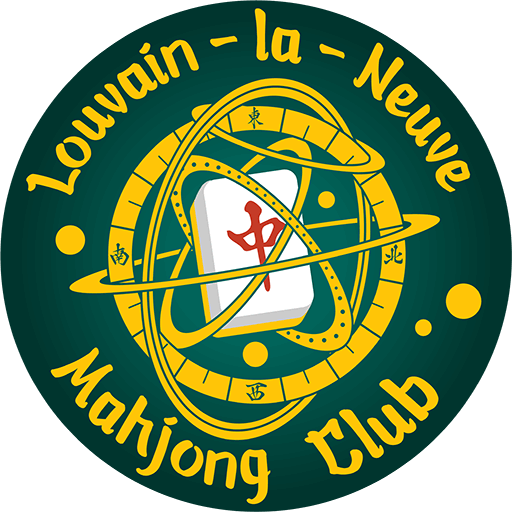Traditional Riichi Mahjong Rules
The Louvain-la-Neuve Mahjong Club plays a version of Riichi Mahjong that is close to what is traditionally played in Japan in Jansou parlours. These are the same rules used in most online Riichi video games, like Mahjong Soul, Tenhou and even Final Fantasy XIV. The flow of the game is identical in every version of Riichi Mahjong, and only minor differences need to be pointed out.
The most recent official EMA rules are available for download on our site, as well as earlier rulesets translated in French. You can use these rulesets as a base line, keeping in mind that there are some differences with the Club’s play style and rules.
- [EN] EMA Riichi Rules 2016 (PDF)
Louvain-la-Neuve Mahjong Club Rules
The Club’s main goal is to promote making new acquaintances and discover the game of Mahjong. We apply rules that are welcoming and favour learning with tolerance of mistakes and other difficulties. Players are free to change places with others during play, discuss, exclaim, exchange advice, take pictures etc… The experience must a be fun, pleasant and constructive one, first and foremost.
EMA rules are in application, with these exceptions:
- We forgive unintentional mistakes. Therefore, no Chombo is applied and dead hand situations are resolved when possible:
- A bad call or showing tiles with unintentional errors is always forgiven.
- Revealing tiles from the wall: If possible, simply swap the tiles with others that haven’t been revealed, at random.
- If a hand has an incorrect number of tiles, this is remedied at the start of the player’s turn by drawing more tiles or discarding tiles in excess. Dead hand is only applied if it is not possible to remedy the situation.
- If it is not possible to proceed with the game normally, instead of applying a Chombo, the hand is simply aborted and restarted, with no honba or change of winds.
- Red 5s (akadora) are included in play. One per suit.
- Each player’s starting points is set to 25 000.
- A minimum score of 30 000 points is needed to win the game.
- The game ends if a player’s score is negative.
- A player cannot declare Riichi if they don’t possess at minimum 1000 points.
- There is no repeat if the East player is first and ends in tenpai or wins the hand in South 4. The game ends automatically in that case.
- The hand is aborted and restarted anew with an added honba in these cases:
- When a player’s starting hand includes at least 9 unique terminal and honor tiles (at the player’s request, optional).
- When the same wind tile is discarded by all four players on the first turn.
- When 4 kans are declared in the course of the same hand (except if all 4 are declared by the same player).
- When 4 players declare Riichi successfully during the same hand.
- When 3 players declare Ron at the same time.
- A hand with 13+ han is counted as Yakuman.
- Blessing of Man (Renhou) is counted as Yakuman.
- Double Yakuman are allowed and counted as such for Big Four Winds (Daisuushii), True Nine Gates (Junsei Chuuren Poutou, 9 waits), Thirteen-Wait Thirteen Orphans (Kokushi Musou Juusan Menmachi, 13 waits), and Four Concealed Triplets waiting on the pair (Suuankou Tanki).
- Nagashi Mangan s allowed and counts as a local Yakuman. It is thus renamed Nagashi Yakuman.
- It is allowed to add up multiple Yakuman .
- There is no wind ceremony for seat assignments at the start of the game. Players seat themselves wherever they feel like, and a roll of the dice determines who will start as East.
Begining Players
We recommend that begining players, regardless whether they’ve played any kind of Mahjong before or not, join us in person at the Club to learn the game! We’re always happy to organise initiation tables, where it is far easier to learn the rules progressively in company of experienced players who can explain the basics progressively as well as offer guidance and advice.
You may also consult the above PDF or visit our download page for more resources, or check out our play guide which presents the basic rules.
